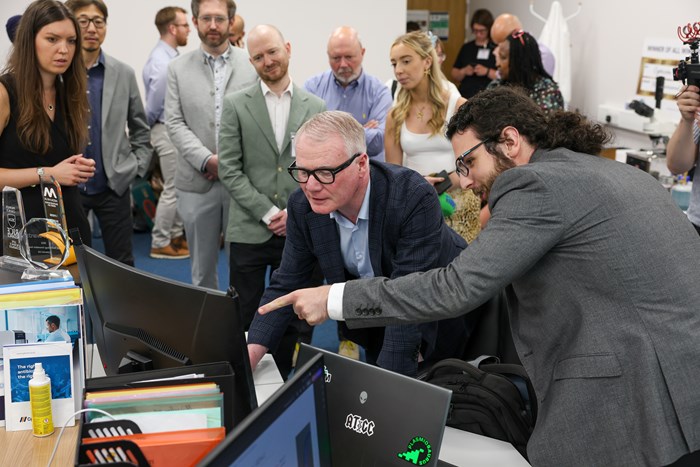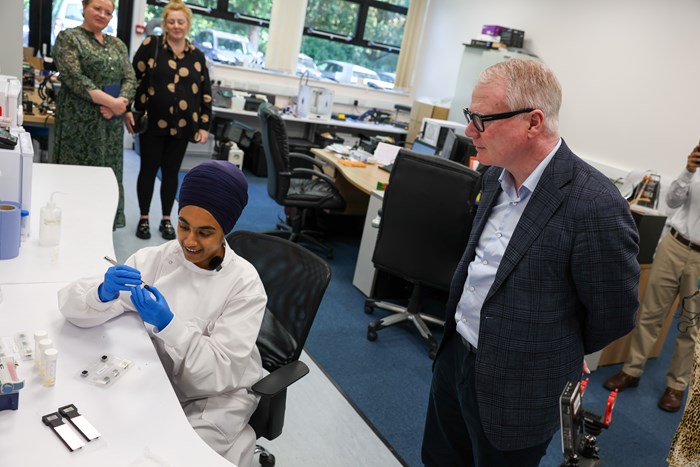Mayor backs region’s medical technology firms to save lives, create jobs and reignite the economy
Published: Wednesday 13 Aug 2025
Mayor Richard Parker has announced plans to turbocharge the region’s health and medical technology sector during a visit to see a pioneering diagnostics device with the potential to save hundreds of thousands of lives.
The Mayor was shown the cutting-edge technology, a world first, during a visit to Coventry-based Cytecom which has created a groundbreaking approach to diagnosing bacterial infections, helping to combat so-called superbugs.
The technique offers a new tool in the fight to stop microbes becoming immune to antibiotics. The problem, known as Antimicrobial Resistance (AMR), is considered one of the top ten biggest health threats to humanity.
Blood stream infections and sepsis are already responsible for 20% of all global deaths, a number that is predicted to rise due to the growing threat of AMR.
But Cytecom’s technology is able to identify in less than an hour, rather than days, which antibiotic will work. By delivering near-real-time results, clinicians can choose the right antibiotic far sooner than with traditional culture-based methods – a critical advantage when treating time-sensitive conditions such as sepsis

Dr. Magdalena Karlikowska, Cytecom’s CEO (far left) and Phd student Tudor Onose (right) show Mayor Richard Parker the ground breaking technology
Cytecom is one of around 700 West Midlands firms that make up the region’s health and medtech sector which is now one of the biggest and most respected in the UK.
The sector specialises in developing cutting edge medical devices, diagnostics and associated digital healthcare, employing more than 14,000 people and generating a £6bn annual turnover for the West Midlands economy.
As part of his Growth Plan, the Mayor has announced plans to build on existing tailored support for the sector so it can create thousands more well-paid jobs for local people and help build a regional economy focused on the fast-growing industries of the future.
The Mayor said: “Advances in technology, many of them developed right here in the West Midlands, are helping our hard-working doctors and nurses save more lives than ever before.
“But this isn’t just about helping people live longer, healthier lives – as important as that is. This is also about building a successful and futureproof economy – one that is driven by technology and high productivity and able to create the secure, well-paid jobs that people can build their lives around.
“That’s why my Growth Plan makes a commitment to nurturing our region’s talent in this cutting-edge industry and making the West Midlands the best place in the UK to start and grow a health or medtech business.”
The Growth Plan provides a blueprint to reboot the regional economy, raise living standards, and put an extra £8,600 back into the pockets of working people.
Health and medtech is one of five high growth sectors in the West Midlands economy identified in the Plan as having a leading edge and significant potential for the creation of skilled, high-paid jobs
The Plan sets out to drive a new era of prosperity by creating 100,000 good jobs in fast-growing industries like health and medtech, advanced manufacturing, digital and AI technology and business and financial services.
Cytecom is one of 114 health and medtech firms that have been supported by the West Midlands Health Technology Innovation Accelerator (WMHTIA), which helped it reach a major milestone in commercialising its device. The firm is also conducting pre-clinical work with Leicester University and NHS Leicester with funding from the Department of Health and Social Care via the National Institute for Health and Care Research.
WMHTIA, a project which brings together 21 partners across academia, industry and the NHS, provides specialist support in developing ground-breaking health tech solutions. The project has already raised £50m in private co-investment which is helping to reignite the regional economy

R&D scientist Inderpreet Kaur gives Mayor Richard Parker a demonstration of the diagnostic device - the first of its kind in the world
During his visit to Cytecom the Mayor met with 24-year-old Tudor Onose, an iCASE PhD student from the University of Warwick who is conducting his research jointly between the university and Cytecom.
Tudor, who came to Coventry from Romania to study at the university, said: “Working on this project alongside Cytecom has allowed me to bridge the gap between the academic medium I have been a part of for several years and real-world product development.
“It is very gratifying to see the work I carry out have a direct application, especially in a field as impactful as helping doctors detect infections faster, improving patient care in the process."
Dr. Magdalena Karlikowska, Cytecom’s CEO, added: “Antimicrobial resistance already means longer hospital stays, higher healthcare costs, and, tragically, more lives lost. In Europe alone, it costs an estimated €11.7 billion every year in health expenses and lost productivity, and by 2050, superbugs could claim 10 million lives worldwide each year.
“We urgently need better ways to use antibiotics wisely, alongside new drugs and rapid tests. Our technology gives doctors results in minutes instead of days, helping them choose the right antibiotic straight away, and with the potential to save millions of lives.”
Under the Growth Plan the West Midlands Combined Authority (WMCA) and partners from the private sector and local universities will work with the Office for Life Sciences on strengthening inward investment and specialist regional business support for the health and medtech sector.
This will build on the success of the WMHTIA in scaling up innovative health and med-tech firms across the region and use the region’s Investment Zone sites and stronger partnerships between the NHS, academia and industry to unlock health and medtech innovation and drive growth.
Further enquiries
For all other enquiries from members of the public go to our contact us page: https://www.wmca.org.uk/contact-us/
